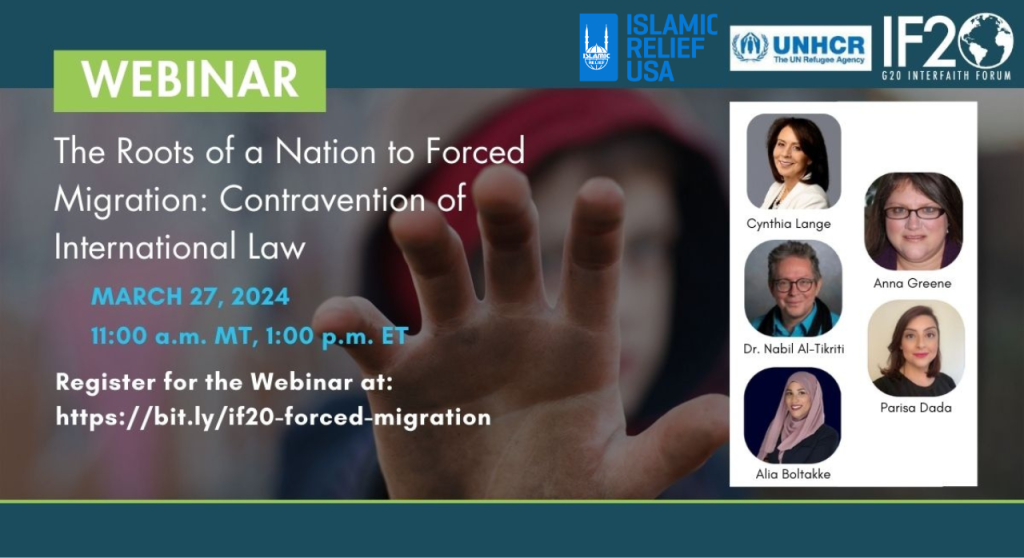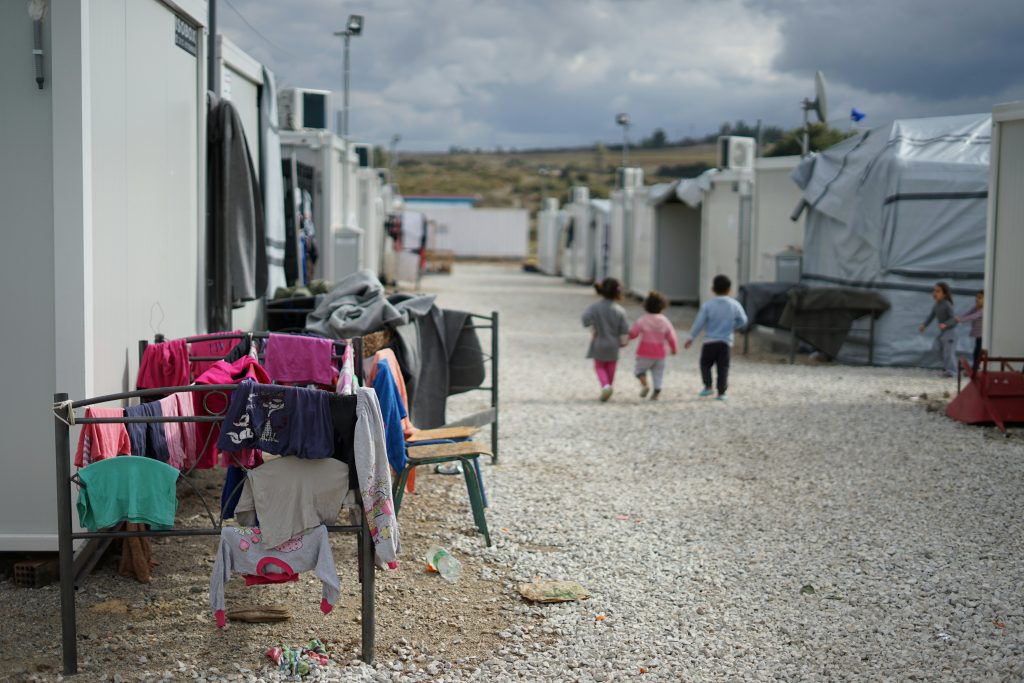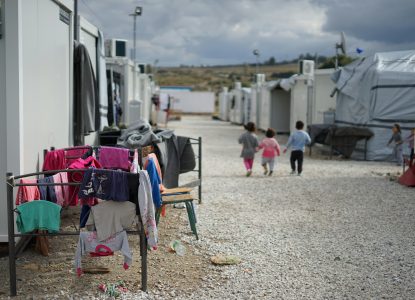By JoAnne Wadsworth, Communications Consultant, G20 Interfaith Forum
— —
On March 27th, the IF20 Refugee Working Group, in conjunction with Islamic Relief USA and USA for UNHCR (The UN Refugee Agency), co-hosted a virtual panel discussion entitled “The Roots of a Nation to Forced Migration: Contravention of International Law.” The event brought together experts to explore the global landscape of refugees, asylum seekers, and migrants, the challenges they face, and potential solutions.
Speakers included Cynthia Lange, Senior Counsel at Fragomen; Anna Greene, Senior Protection Officer at the UNHCR; Dr. Nabil Al-Tikriti, Professor of Middle East History at the University of Mary Washington; Parisa Dada, Program Officer at the USRAP Capacity Development Team for IRC (International Rescue Committee); and Alia Boltakke, Founder and Attorney at the Boltakke Law Group, with Mohamed Ali as moderator.

Mohamed Ali opened the discussion by welcoming the attendees and introducing the esteemed panel of speakers, encouraging a substantive dialogue on the pressing issue of refugees and migration. “Let’s get after it,” he said, inviting Anna Greene of UNHCR to set the broader context, followed by comments from the rest of her fellow panelists.
Anna Greene
Greene provided a comprehensive overview of the global refugee crisis and the challenges faced by the international community in addressing it. She highlighted the unprecedented scale of displacement, with over 110 million people forcibly displaced worldwide, and the majority of refugees being hosted by neighboring countries. Greene emphasized the strain on asylum systems, particularly in countries receiving mixed migration movements, and the growing backlog of cases.
“Currently there are over 110 million forcibly displaced people worldwide, with 36.4 million refugees, the vast majority of which are living in neighboring countries. The largest refugee-hosting countries are Iran, Turkey, Germany, Pakistan, and Uganda. The largest per-capita hosting country is Lebanon.”
Greene also addressed the complex nature of contemporary refugee crises, which are often protracted and involve multiple drivers of displacement. She stressed the need for a more comprehensive and coordinated response from the international community, including increased resettlement opportunities, improved asylum procedures, and greater support for host countries. Greene called for a renewed commitment to the principles of the 1951 Refugee Convention and the importance of upholding the rights and dignity of those forced to flee their homes.
Cynthia Lange
Lange delved into the legal criteria for refugee status under the 1951 Convention, contrasting it with the broader categories of migrants, asylum seekers, and internally displaced persons (IDPs). Turning to the Americas, she discussed the alarming increase in migration through the treacherous Darién Gap between Colombia and Panama.
“Criminal organizations are starting to take over these regular migration paths. Organized crime thrives on this crisis and exacerbates it. Human smuggling has morphed into one of the most lucrative industries for crime groups, just under drugs but growing fast.”
Lange pointed to potential solutions, highlighting the need for coordinated law enforcement responses, increased funding, and ensuring safe third countries have adequate capacity to process and protect asylum seekers.
Alia Boltakke
Boltakke focused on the impact of the US-Canada Safe Third Country Agreement on asylum seekers and the broader challenges facing the US asylum system. She discussed the diverse drivers of migration to the US southern border, including violence, persecution, and economic instability in Central America, and the political nature of immigration policies that affect backlogs and wait times for asylum cases.
Boltakke also addressed the need for a more humane and effective approach to asylum processing, one that prioritizes the safety and well-being of those seeking protection. She highlighted the importance of legal representation for asylum seekers and the role of advocacy in pushing for policy changes that respect the rights of refugees and migrants. Boltakke emphasized the need for a more nuanced understanding of the complex factors driving migration and the importance of addressing root causes in countries of origin.
Additionally, Boltakke discussed the challenges faced by asylum seekers navigating the US immigration system, including the lack of access to legal counsel, the prolonged detention of individuals in immigration facilities, and the impact of policies such as the “Remain in Mexico” program on the ability of asylum seekers to pursue their claims. She stressed the need for a more compassionate and fair approach to asylum processing, one that upholds the principles of due process and ensures that individuals fleeing persecution have the opportunity to seek protection in the United States.

Nabil Al-Tikriti
Al-Tikriti contrasted the situations in Palestine and Sudan with broader refugee policies, arguing that the sheer scale of global displacement has swamped not only asylum systems but also countries without established procedures, fueling increased hostility towards those on the move.
“Over the last 30 years of professional time in the field, I’ve noticed that the numbers of displaced have gone from something like 30 million worldwide to 110 million — that’s like 1 in 65 human beings. It’s swamping not just asylum systems, but other countries that don’t have established systems.”
Al-Tikriti emphasized the need for a just and comprehensive solution to the Israeli-Palestinian conflict, warning of the potential for further regional destabilization and displacement if the situation deteriorates. He also highlighted the underreported crisis in Sudan and the long-term outlook for Africa and the Middle East, given environmental pressures and the Global North’s tendency to externalize the issue.
Parisa Dada
Dada shared insights into the work of the International Rescue Committee (IRC), assisting over 35,000 individuals through refugee resettlement, economic empowerment, health and safety programs, and more. She advocated for a multifaceted solution.
“If we are not creating a safe passage for people to come here, you might see them trying to create their own path, and that leaves them in a lot of danger of being trafficked. We need more humanitarian and employment pathways in the third country to help people get citizenship, residency, asylum, etc. We need to open the pathways. There also has to be a global movement for safety and security, focused on conflict resolution and environmental policy.”
Q&A and Conclusion
After a short Q&A session, where panelists fielded questions from the audience related to their expertise, Ali brought the meeting to a powerful conclusion with one last question for the panelists: Why do you do this work?
Each panelist shared their personal motivations for persevering in this challenging field, from family histories of immigration to the conviction that the refugee system, while imperfect, is critical for global stability and human welfare.
“It’s a system, although complicated, and though it’s not the best, it’s working. We’re improving the human condition and we will continue to do so, even if we aren’t highlighted in the media. We can show that multiculturalism does work.” – Parisa Dada
The event closed with a reflection on the guiding scripture of Islamic Relief USA, emphasizing the collective responsibility to uplift humanity and drive positive change from within. Although the path forward is complex, the discussion highlighted the urgency of strengthening protection frameworks, addressing root causes, and affirming the dignity of all those forced to flee their homes.
— —
JoAnne Wadsworth is a Communications Consultant for the G20 Interfaith Association and acting editor of the “Viewpoints” blog.


